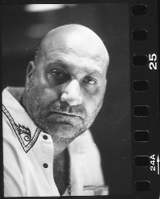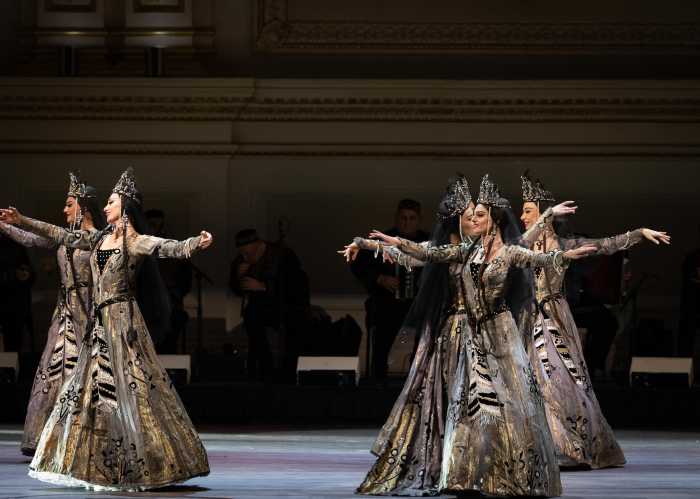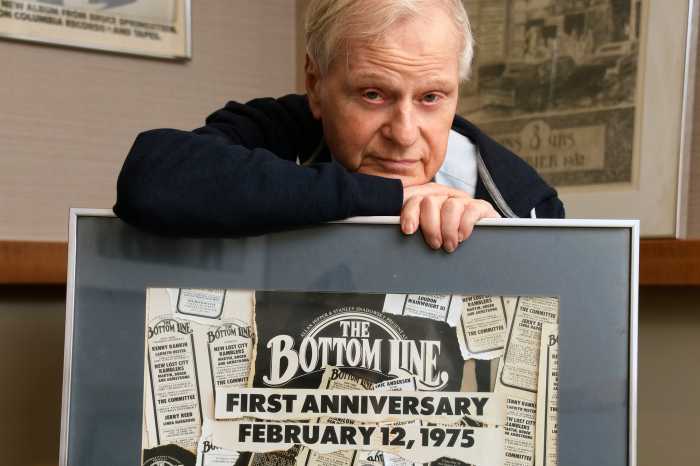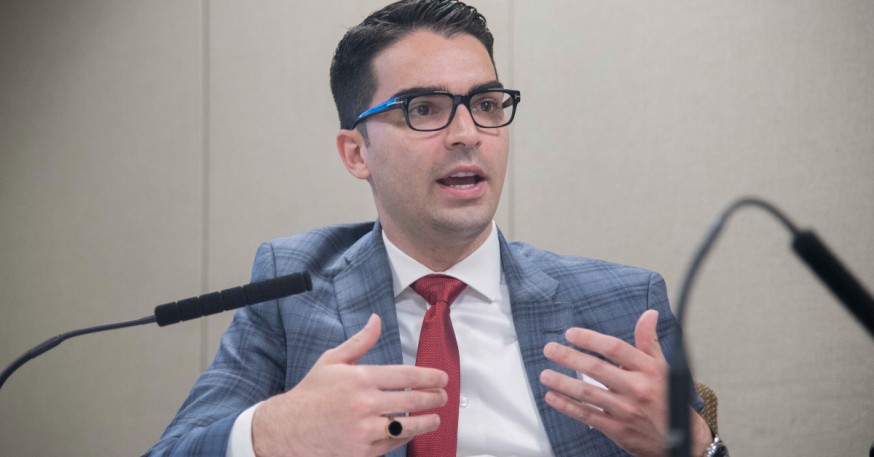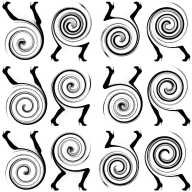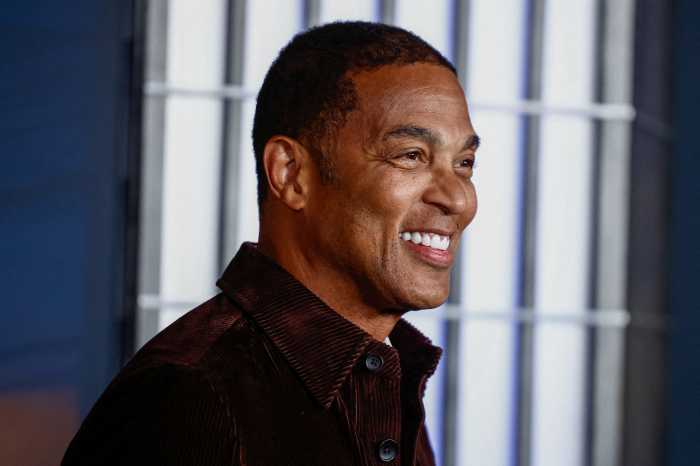BY Jerry Tallmer
Works with mentally-ill young people
The surgeon who scrubs his hands, dons a gauze mask, and operates to carve the insanity out of the brain of Jesus Christ — this via video screen off-off-Broadway at Ellen Stewart’s La MaMa, while Satan, on stage, giggles in triumph — is the same man who as a hard-faced Roman soldier lashes the Christ so brutally, so mercilessly, on screens of another sort viewed by millions around the world.
The movie on those millions of screens was and is Mel Gibson’s “The Passion of the Christ,” and the actor playing the Roman soldier is a husky, balding, ebullient 46-year-old Italian playwright (and onetime all-star soccer player) who has spent more than half his life working in theater with people, particularly young people, whom the outside world considers insane. His name is Dario D’Ambrosi.
The play (which includes the video) at La MaMa is “The Pathological Passion of the Christ,” written and directed by Dario D’Ambrosi. He has been bringing his plays and himself to La MaMa for 25 years now. This is the first that he himself has not been in. Except, that is, unrecognizably, on video screen, “Even Ellen doesn’t know,” he said with a smile, shortly before the December 9 opening.
D’Ambrosi’s “Passion” sets forth its own harsh-talking or bland-talking versions of Pilate (Brian Glover), Peter (Peter Case), Caiaphus (Jonathan Slaff), Judas (Alex Plat), Mary (Shawneeka Woodward), and, oh yes, Satan — the hospital floor-sweeper (D’arcy Drollinger).
D’Ambrosi’s thesis: The insanity of Jesus (Arthur Adair) is what could save the world from war, pestilence, starvation, disease, death. When the insanity is removed from Christ’s brain, the salt of the world — humanity — no longer has its savor. Satan triumphs. Look around you.
And D’Ambrosio the lasher?
He whipped the Christ (James Caviezel) every day for a month during the shooting in Rome.
“They now have a name for me in Rome: Il Flagellatore. Everybody says: ‘I know the Flagellatore’ or ‘The Flagellatore, he is a friend of mine.’ There is even a Flagellatore Website.”
But the kids of Cavallo Blanco, the White Horse, the school and home in an old building, once a hospital, in the center of Rome — the Cavallo Blanco where D’Ambrosi has been working with mentally off-course children and adults for 30 years — “They come to me and say, ‘Dario, you make us cry so much.’
“My daughters also, Michela and Maria, they cried so much [at his lashing of Jesus] that they called my mother and said: ‘Grandmother, don’t go see this movie.’ “
And did your mother go to see it?
“No. Never.”
It was casting director Shaila Rubin who had brought Mel Gibson and Dario D’Ambrosi together.
“She said to Mel: ‘I want you to meet Dario D’Ambrosi of La MaMa Theater in New York.’ Mel liked that very much. He said: ‘Oh, you did a show at La MaMa?’ I said: ‘Mr. Gibson, I did 14 shows at La MaMa.’ “
The first of them was when, in 1979, a total stranger from afar, he walked in on Ellen Stewart, who forthwith gave him a stage on which to do a piece called “Tutti non ci sono,” or “Everybody’s Not Here,” about a man who steps outside his insane asylum, looks around, and wants to go back in.
Gibson gave D’Ambrosi the part of the Roman soldier after just that one meeting.
Did you know, Dario, what the part was, what it entailed”
“No way, no way. I think he was afraid to tell me.”
And when you found out?
“I was very upset. A priest and a nun from the Vatican came to the set. They said: ‘My God, you’re such a bad guy.’ So I asked Mel: ‘Why do you give me this bad part?’ He said: ‘Because you have the eyes of a good person. I would not give that part to someone with the eyes of a bad person.’
“You know, Mel created a little church on the set where we would go for Mass in the morning. He himself knew the Mass in Latin! But at the same time, we kill the Christ.
“When I whip him, I don’t see the face of Jesus. I only see the face of Mel Gibson, looking up at me from the floor, saying: ‘Go, Dario, Go!’ He like it very much when my face is so hard. Hard like a criminal. He love it.”
D’Ambrosi says that his play (for all the parallel title) has nothing to do with the Mel Gibson movie.
“While we are making the movie I was talking so much with the priests and with the historic people on the set. They tell me: ‘Dario, you work so much with schizophrenics, do you know that Jesus Christ may have been an epileptic? Like Joan of Arc, an epileptic.’
“So I think about that, and I think of this story, where Jesus is an epileptic, and all the other characters, Caiaphus and Pilate and Peter and Judas, they come and take Jesus and put him in the hospital and operate on his brain.
“And he has this beautiful monologue: ‘Brothers, you judged me crazy, a liar, a hypocrite. You judged me, and that by itself is an enormous mistake. Yes, because it was thanks to that thing that you considered my craziness that you could have really been the salt of the world . . .
“ ‘The wisdom of my madness gave a balance to the cruelty of your hearts. And now that you wanted me to become normal like you, descending amongst God’s sons just like any ordinary man, the madness finds no space in my heart, and your salt has no taste . . .
“ ‘Madness has now taken control over your minds . . . You only know how to destroy and bring death and terror on earth and hide your evilness behind religious and economic and political interests . . . And that is why the only thing left for me to do is to pray for you to give again taste to the salt of the earth.’ “
D’Amrosi, by the way, has directed his own first movie, “Il Ronzo delle mosche,” or “The Buzzing of the Master,” again meaning Christ. It stars Greta Scacchi, and it’s about a world that’s trying to create additional crazy people — men and women with flies buzzing in their brains — because there are only three such crazies left in the whole world, and how can we be normal without crazies?
“Greta Scacchi heads the medical team — and at the end we understand that she too has flies in her brain.”
As for Mel Gibson’s ultra-controversial movie, D’Ambrosi is well aware that “everybody talks so much about violence and anti-Semitism, but you know, to me, I think it is a great movie because it is about the love of a mother for the son.”
Yes, he has invited Mel Gibson to see “The Pathological Passion of the Christ.” It has no Flagellatore in it. But it does have a brain surgeon. Go, Dario, go!



